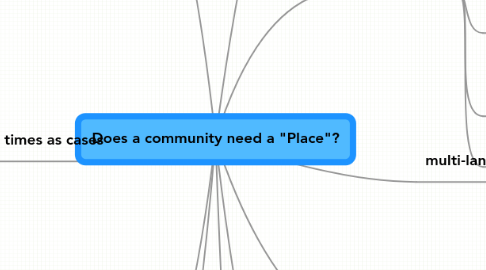
1. Technology issues
1.1. Using email threads and a wiki to organize the Setubal conference was kind of a mess
1.2. practice
1.3. affordances of specific applications
1.4. Shared places
1.5. Naming
1.5.1. attractive
1.5.2. agenda-setting
1.6. Do we have technologies for building maketplaces no Malls?
1.7. Neccessary practices
1.8. What can technologies & our use of them do?
2. Examples / times as cases
2.1. Bron
2.1.1. Mirandanet has f2f events
2.1.2. Doctoral research
2.1.2.1. Safe harbor for teachers
2.1.3. Foundations workshop
2.1.3.1. Opening week is like coming home
2.1.3.2. Bound up in role
2.2. Bev
2.2.1. Equal has money for online
2.3. Derek
2.3.1. Project grou
2.3.2. Being together
2.3.3. Tryst
2.3.3.1. one-dimensional
2.3.3.2. pier/cafe
2.4. Maarten
2.4.1. Holland as a place
2.4.1.1. View as exile
2.5. Josien
2.5.1. Moving around in the world
2.5.2. Portable groups
2.5.3. Portuguese neighbors who can't imagine moving
2.6. John
2.6.1. Plaza in Humacao
2.7. Alasdair
2.7.1. Setubal
2.7.1.1. Familiarity of the scene
2.7.1.2. memory of people who are absent
2.8. Bev
2.8.1. Setubal
2.8.2. Blog
2.8.3. BP2 - Web Crossing
2.8.3.1. No longer
2.8.4. Feed
2.9. Joao
2.9.1. Online community where you felt at ease, accepted
2.9.2. destroyed by "owners"
2.10. Shirley
2.10.1. Facebook
2.10.1.1. for some like email to check
2.10.1.2. different communities
3. Sponsorship
3.1. Project
3.2. Self-supporting community
3.3. Purchasing a CoP
3.4. Go to the doctor for a prescription
3.5. intention
3.5.1. I want to manipulate students
3.5.2. scaffolding
3.6. Diagnoses
4. Books & references
4.1. Cathedral & the bazaar
4.2. Alexander: pattern language
4.3. Oldenburg: The Third Place
4.4. Alexander: Timeless way of building
4.5. Bron has: socialy autistic online spaces
5. What new questions could we ask?
5.1. What's the difference between market & mall?
5.1.1. Do Malls kill interaction?
5.1.2. Do we have technologies that are useful to build marketplaces or to build malls?
5.2. What evokes a sense of place
5.3. Different perspective of owner vs other
5.4. Practices for "concentrating place"
6. versions in practice
6.1. Mall
6.1.1. prescriptive
6.1.2. order
6.1.3. formal
6.1.4. Uniform
6.1.5. Private
6.1.6. Clone town
6.1.7. comfortable
6.1.8. predictable
6.1.9. controled
6.1.10. intentional
6.2. Marketplace
6.2.1. informal
6.2.2. Bazaar
6.2.3. public
6.2.4. smelly, dirty, chaotic
6.2.5. unproductive
6.2.6. active
6.2.7. evolving
6.2.8. open source
6.2.9. emergent
6.2.10. unknown
6.2.11. distributed
7. multi-language online
7.1. automatic translation
7.1.1. http://www.google.com/language_tools
7.1.2. http://www.altavista.com/help/free/free_searchbox_transl
7.2. collaborative glossary building
7.2.1. reputation system -> database
7.2.1.1. e.g. translators CoP http://www.proz.com/kudoz/1947280
8. Is it important for a CoP?
8.1. Untitled
8.1.1. real stuff happens in f2f
8.1.1.1. online is a weak place?
8.1.2. efficiency
8.2. individual variance
8.3. holographic nature
8.4. Sense of community confounded with sense of place?
8.5. Ability to migrate
8.6. Practices to deal with lack of?
8.7. What does place mean?
8.7.1. Creating an identity
9. Metaphors
9.1. swimming in the same stream
9.1.1. Beth Kanter's image of the NPtech community
9.2. place = identity
9.2.1. technology allows multiple places so multiple identities
9.2.2. individuals create it, it creates them
9.2.3. Safe harbor
9.3. Embodiment
9.4. Home
9.5. Language
9.5.1. common narrative
9.5.2. Accent as indicator of knowledge
9.5.3. shared assumptions
9.5.4. collusion
9.5.4.1. the collusion of anonymity
9.6. MY place vs COMMUNITY space
9.7. Third place
9.7.1. Harbor between home & work
9.7.2. English pubs
10. Values
10.1. Structure
10.2. Intentional
10.2.1. Setubal
10.2.1.1. not so convenient
10.2.1.2. lack of privacy
10.2.2. Hotel
10.3. Insider / familiarity / comfort
10.4. Anxiety
10.5. fluiditiy
10.5.1. alternation of comfort & anxiety
10.5.2. control over comfort & axniety
